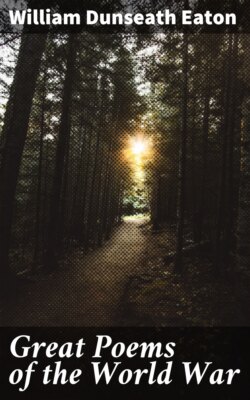Читать книгу Great Poems of the World War - William Dunseath Eaton - Страница 19
На сайте Литреса книга снята с продажи.
THE GRAVES OF GALLIPOLI
L. L. (A. N. Z. A. C.)
ОглавлениеTable of Contents
From “The Anzac Book.” Cassell & Co., Ltd., Publishers, London. Special permission to reproduce in this book.
This poem is one of many that were written to commemorate the stubborn bravery of the Anzacs, the British soldiers from Australia and New Zealand. These indomitables came half way round the globe at Britain’s first call. Their first appearance was in Egypt, where they drove the German-led Turks back into the desert and saved the Suez canal. They were and are officially designated the “Australian and New Zealand Army Corps,” a title too long for common use. They have won fame and the world’s admiration as the “Anzacs,” a word made by running together the first letters of their official title. Australia’s own name for her soldier is Bill-Jim. “The Graves of Gallipoli” is one of the most noble and tender poems that have come to us out of the war.
THE herdman wandering by the lonely rills
Marks where they lie on the scarred mountain’s flanks,
Remembering that wild morning when the hills
Shook to the roar of guns, and those wild ranks
Surged upward from the sea.
None tends them. Flowers will come again in spring,
And the torn hills and those poor mounds be green.
Some bird that sings in English woods may sing
To English lads beneath—the wind will keep
Its ancient lullaby.
Some flower that blooms beside the southern foam
May blossom where our dead Australians lie,
And comfort them with whispers of their home;
And they will dream, beneath the alien sky,
Of the Pacific Sea.
“Thrice happy they who fell beneath the walls,
Under their father’s eyes,” the Trojan said,
“Not we who die in exile where who falls
Must lie in foreign earth.” Alas! our dead
Lie buried far away.
Yet where the brave man lies who fell in fight
For his dear country, there his country is.
And we will mourn them proudly as of right—
For meaner deaths be weeping and loud cries:
They died pro patria!
Oh, sweet and seemly so to die, indeed,
In the high flush of youth and strength and pride.
These are our martyrs, and their blood the seed
Of nobler futures. ’Twas for us they died.
Keep we their memory green.
This be their epitaph. “Traveler, south or west,
Go, say at home we heard the trumpet call,
And answered. Now beside the sea we rest.
Our end was happy if our country thrives:
Much was demanded. Lo! our store was small—
That which we had we gave—it was our lives.”
